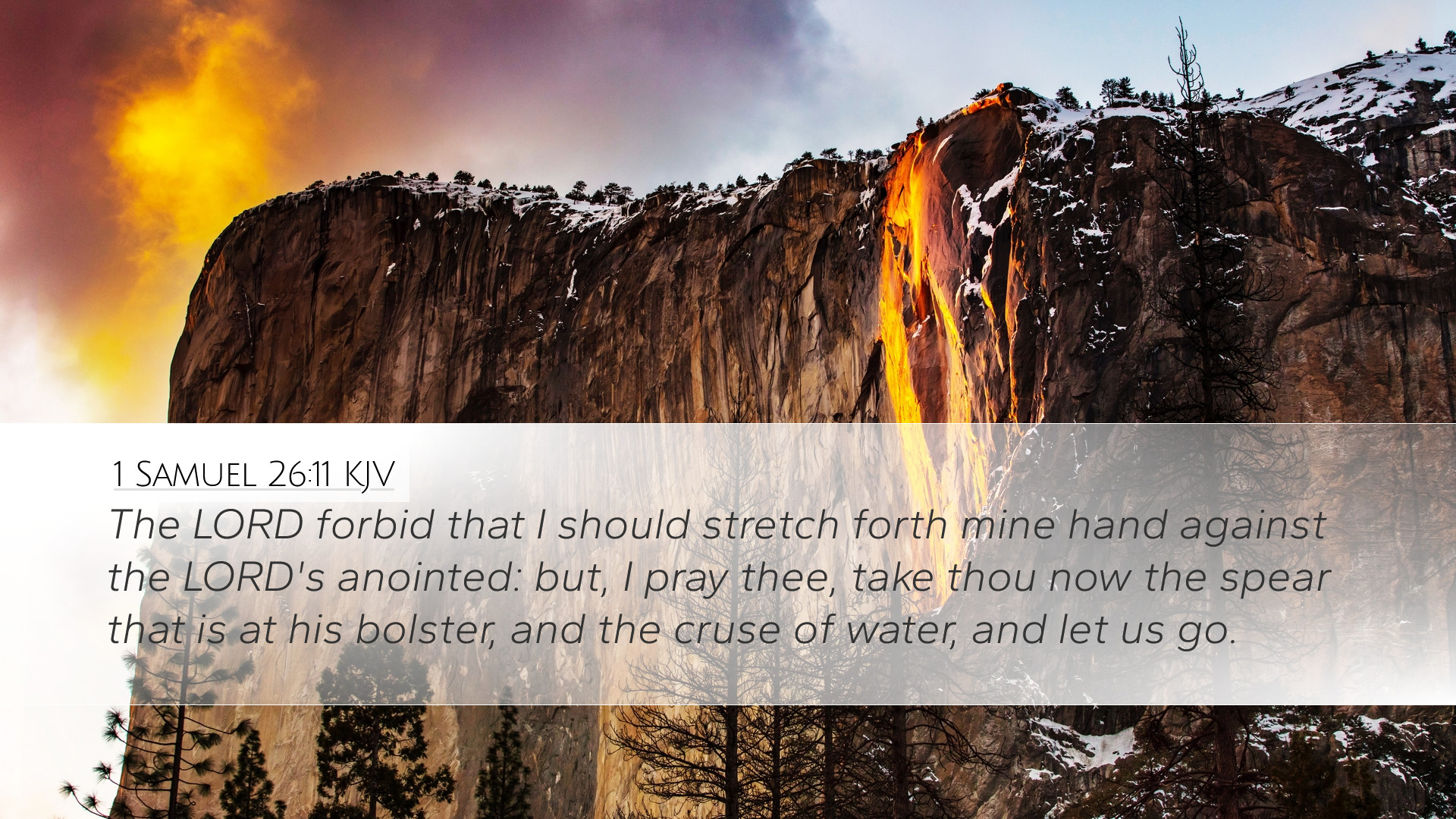Commentary on 1 Samuel 26:11
Verse: "The LORD forbid that I should stretch forth mine hand against the LORD's anointed: but, I pray thee, take thou now the spear that is at his bolster, and the cruse of water, and let us go." (1 Samuel 26:11)
Introduction
This verse occurs during a critical moment in the life of David as he encounters Saul in the desert of Ziph. This incident illustrates themes of respect for authority, divine sovereignty, and the moral dilemmas faced by believers. Through the insights of renowned biblical commentators such as Matthew Henry, Albert Barnes, and Adam Clarke, we uncover layers of meaning that are pertinent for pastors, students, theologians, and scholars alike.
Contextual Overview
The setting of this verse is a powerful narrative that reveals David's respect for God's anointed king, despite Saul's pursuit of his life. David's actions in this chapter emphasize ethical considerations in circumstances where his life is endangered.
1. The Danger of Saul's Pursuit
David finds himself constantly fleeing from Saul, who is consumed by jealousy and a desire to eliminate David, whom he sees as a usurper of his throne. Barnes noted that Saul's intent was to kill David, yet David exhibited a remarkable response to this threat.
2. David's Moral Integrity
Matthew Henry remarked that David’s restraint reflects a deep understanding of God’s authority. David’s refusal to harm Saul demonstrates profound respect for the Lord’s anointed, a significant aspect of Hebrew kingship.
Commentary Insights
David’s Declaration of Faith
Divine Sovereignty: David articulates a principle rooted in the belief that the king's authority is derived from God Himself. This acknowledgment illustrates the gravity of such an act against the king, which would be tantamount to rebelling against God's will.
Respect for God’s Anointed
David calls Saul "the LORD's anointed," emphasizing his unwillingness to act against God’s choice. Clarke underscores that David comprehended the dire consequences of taking a life ordained by God and chose fidelity to divine order over personal vengeance.
Strategic Pilfering for Survival
Furthermore, the action of taking Saul's spear and water jar symbolizes not only a tactical decision—demonstrating David’s cunning and foresight—but also a significant moment to reflect on what believers possess when they act righteously under pressure.
Ethical Considerations
David’s decision embodies ethical teaching, which resonates with believers today. The tension between self-preservation and moral integrity is critically explored. Decisions made in dire circumstances often reveal one’s true character, and David exemplifies this through profound wisdom and restraint.
Theological Implications
The act of sparing Saul can be seen as an allegory for spiritual struggle. Believers are called to confront evil with righteousness, even when under threat. The perception of David as a type of Christ can be highlighted; just as Christ refrained from vengeance, so did David.
1. Belief in Divine Justice
David trusted that God would deliver justice in His own time. This theme of divine retribution speaks volumes about the nature of faith and patience. Barnes emphasizes that believers should remain steadfast in their faith, refraining from enacting personal revenge.
2. The Role of Prayer and Divine Guidance
Throughout the narrative, David's reliance on prayer is evident. He seeks guidance and strength from God, a crucial lesson for modern believers who navigate challenges within their lives and ministries.
Application for Today
The story of David and Saul imparts lessons that remain relevant for contemporary faith communities:
- Respect for Leadership: Even in turbulent times, Christians are called to honor those in authority, recognizing that all power is ordained by God.
- Resisting Temptation: The internal struggle David faced offers a clear warning against succumbing to the temptation of vengeance.
- The Importance of Righteousness: In the face of adversity, maintaining one’s integrity is paramount; a truth expounded by the choices made by David.
- Faith in God’s Plan: Trusting in God’s overarching purpose, even in troubling circumstances, remains a central tenet for believers.
Conclusion
1 Samuel 26:11 serves as a profound artifice in biblical thought, prompting deep reflection on humanity’s moral compass, the sovereignty of God, and the essence of leadership. Through the commentary of Henry, Barnes, and Clarke, we glean insights not only for theological discourse but for practical christian living. As we engage with David’s choice to spare Saul, may we also navigate our own paths with similar integrity, respectful of God’s anointed and trusting in His divine justice.


